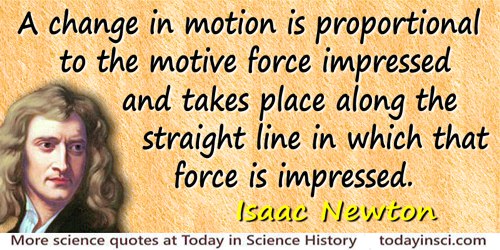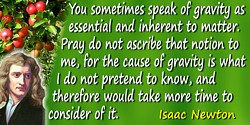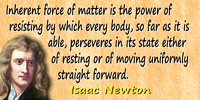 (source)
(source)
|
Sir Isaac Newton
(25 Dec 1642 - 20 Mar 1727)
English physicist and mathematician who made seminal discoveries in several areas of science, and was the leading scientist of his era.
|
Isaac Newton
“A change in motion”
Illustrated Quote - Medium (500 x 250 px)
More Isaac Newton quotes on science >>
Newton wrote his famous three laws of motion in his magnum opus on mechanics, Philosophiæ Naturalis Principia Mathematica. Translated into English, the title is The Principia: Mathematical Principles of Natural Philosophy, familiarly known as simply the Principia. It was first published on 5 Jul 1687, and as the title suggests, it was written in Latin, the language then commonly used by scientists. As it was originally written, the second law of motion appeared in print as:
“Lex II: Mutationem motus proportionalem esse vi motrici impressae, et fieri secundum lineam rectam quâ vis illa imprimitur.”
Newton did not publish a version in English, though various translations have been made since then. The quote as given above is as translated by I. B. Cohen and Anne Whitman (1999). It is very faithful to the original Latin, as seen by comparing with a direct version from Google Translate:
“Law II: The alteration of motion is ever proportional to the motive force impressed; and is made in the right line in which that force is impressed.”
The sense in which Newton meant “change in motion” is what we now call “change in momentum with respect to time.” In a physics class, it is quickly shown how the statement reduces to the familiar equation: F=ma. Because the force, F and the acceleration a are vector quantities, the direction of the resulting acceleration will be the along same straight line as the direction of the impressed force.
After stating his second law, Newton gives further explanation (as translated by Cohen and Whitman):
“If some force generates any motion, twice the force will generate twice the motion, and three times the force will generate three times the motion, whether the force is impressed all at once or successively by degrees. And if the body was previously moving, the new motion (since motion is always in the same direction as the generative force) is added to the original motion if that motion was in the same direction or is subtracted from the original motion if it was in the opposite direction or, if it was in an oblique direction, is combined obliquely and compounded with it according to the directions of both motions.”
- Science Quotes by Sir Isaac Newton.
- 25 Dec - short biography, births, deaths and events on date of Newton's birth.
- Isaac Newton - biography from Famous Men of Science (1889)
- Isaac Newton - Comments on his “Playing on the Seashore” Quote
- Isaac Newton - “Playing on the Seashore” illustrated quote - Medium 500px.
- Isaac Newton - “Playing on the Seashore” illustrated quote - Large 800px.
- Isaac Newton - context of quote “A change in motion” - Large image (800 x 400 px)
- Isaac Newton - context of quote “In experimental philosophy” - Medium image (500 x 250 px)
- Isaac Newton - context of quote “In experimental philosophy” - Large image (800 x 400 px)
- Isaac Newton - context of quote “Standing on the shoulders of giants” - Medium image (500 x 250 px)
- Isaac Newton - context of quote “Standing on the shoulders of giants” - Large image (800 x 400 px)
- Isaac Newton - context of quote “Impressed force is the action” - Medium image (500 x 250 px)
- Isaac Newton - context of quote “Impressed force is the action” - Large image (800 x 400 px)
- Isaac Newton - context of quote “Inherent force of matter is the power of resisting…” - Medium image (500 x 250 px)
- Isaac Newton - context of quote “Inherent force of matter is the power of resisting…” - Large image (800 x 400 px)
- Isaac Newton - context of quote “Plato is my friend” - Medium image (500 x 250 px)
- Isaac Newton - context of quote “Plato is my friend” - Large image (800 x 400 px)
- Isaac Newton - context of quote “Colours which appear through the Prism ” - Medium image (500 x 250 px)
- Isaac Newton - context of quote “Colours which appear through the Prism ” - Large image (800 x 400 px)
- Isaac Newton - context of quote “Nature does nothing in vain” - Medium image (500 x 250 px)
- Isaac Newton - context of quote “Nature does nothing in vain” - Large image (800 x 400 px)
- Isaac Newton - context of quote “No more causes of natural things should be admitted” - Medium image (500 x 250 px)
- Isaac Newton - context of quote “No more causes of natural things should be admitted” - Large image (800 x 400 px)
- Isaac Newton - context of quote “Truth is ever to be found in simplicity” - Medium image (500 x 250 px)
- Isaac Newton - context of quote “Truth is ever to be found in simplicity” - Large image (800 x 400 px)
- Isaac Newton - context of quote “Every body perseveres in its state of being at rest” - Medium image (500 x 250 px)
- Isaac Newton - context of quote “Every body perseveres in its state of being at rest” - Large image (800 x 400 px)
- Isaac Newton - context of quote “God, in the beginning, formed matter” - Medium image (500 x 250 px)
- Isaac Newton - context of quote “God, in the beginning, formed matter” - Large image (800 x 400 px)
- Isaac Newton - context of quote “The cause of gravity is what I do not pretend to know” - Medium image (500 x 250 px)
- Isaac Newton - context of quote “The cause of gravity is what I do not pretend to know” - Large image (800 x 400 px)
- Sir Isaac Newton’s Apple-Tree - debunking the myth, from Historic Ninepins: A Book of Curiosities by John Timbs (1869)
- Newton and the Dog - debunking the myth about Newton’s dog Diamond.
- Booklist for Isaac Newton.









